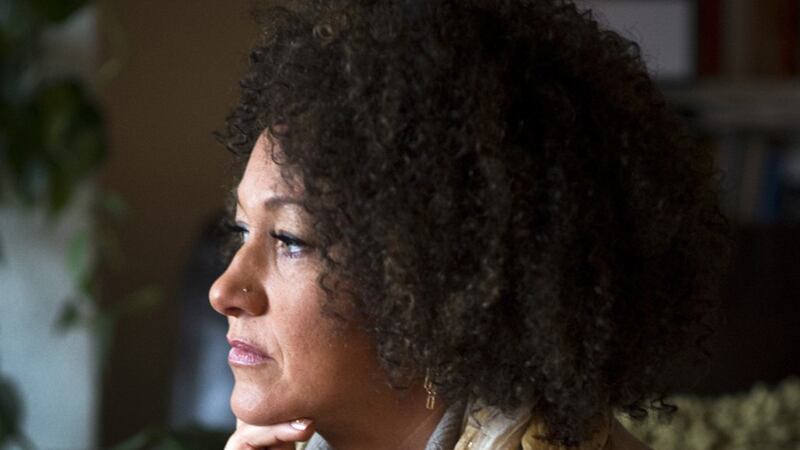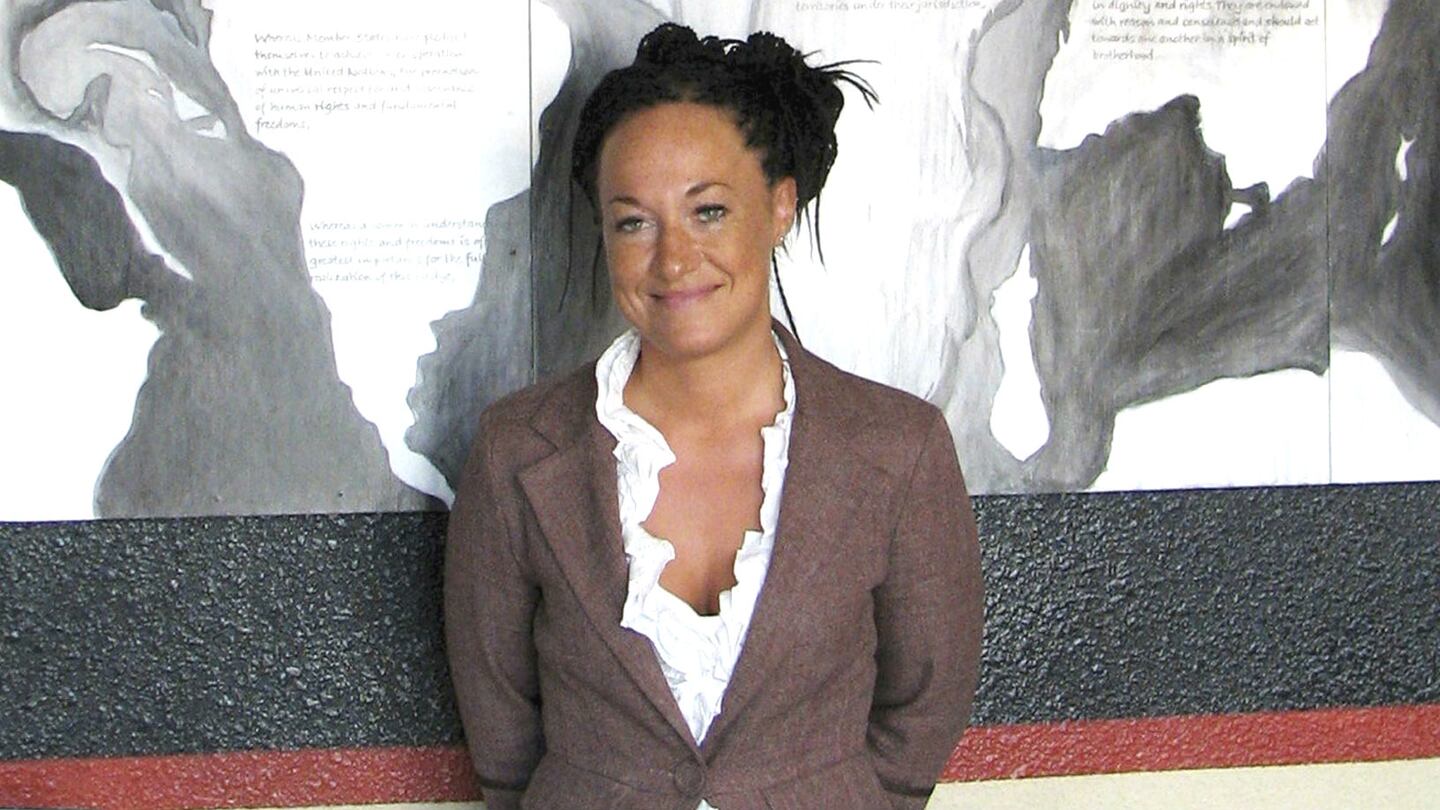SPOKANE, Wash. — A former NAACP official who made international headlines in 2015 when it was discovered she had posed for years as a black woman has been charged with fraud, accused of cheating the government out of $8,847 in public assistance.
Rachel Dolezal, who in 2016 changed her name to Nkechi A. Diallo, was charged Tuesday with first-degree theft by welfare fraud, second-degree perjury and false verification for public assistance, according to court documents obtained by KHQ-TV in Spokane, Washington. The victim in the case is listed as Washington state's Department of Social and Health Services.
Dolezal resigned from her post as head of the Spokane chapter of the NAACP in June 2015 after her white parents came forward and revealed her true lineage. She first applied for public assistance for her and her teenage son two months later, claiming that she no longer was able to find work, the Spokane Spokesman-Review reported.
TRENDING NOW:
- Teacher credited with stopping shooter at Noblesville West Middle School in Indiana
- 'I can't stay': DUI suspect flees fatal wreck, cops say
- What is Nipah virus? Deadly brain-damaging virus spreads in India
- VIDEO: Police charge man in 3-month-old Homewood shooting death
Dolezal, who also worked as a professor of African-American studies, was first questioned about her ethnicity during an interview with KXLY in Spokane. Dolezal in that interview talked about alleged hate crimes she'd reported to police over the years, including nooses she said were hung at homes where she and her two sons lived.
About eight minutes into the raw interview footage, the reporter showed Dolezal a photo of a black man she said was her father, asking if the man was really her father.
“I don’t know what you’re implying,” Dolezal said.
“Are you African-American?” the interviewer asked.
“I don’t understand the question of -- I did tell you that yes, that’s my dad.”
“Are your parents, are they white?” the reporter asked.
Dolezal walked away from the interview.
Dolezal said in later interviews that she identifies as black, a claim that has brought the term "transracial" into the national conversation about race. She is the subject of a Netflix documentary, called "The Rachel Divide," that premiered in April.
The court documents outlining the charges against Dolezal, who is now legally known as Diallo, allege that the DSHS's Office of Fraud and Accountability learned in March 2017 from one of its criminal investigators that she had written and published a book. The investigator, Brad Borden, knew from previous news articles that Diallo had admitted to going on public assistance since her lies about her background had been uncovered.
Diallo told The Guardian for one of those news stories, published on Feb. 25, 2017, that she was jobless and had to resort to feeding her children through the Supplemental Nutrition Assistance Program, formerly known as food stamps.
“A friend helped her pay this month’s rent; next month she expects to be homeless,” the newspaper reported. “She has applied for more than 100 jobs, but no one will hire her, not even to stack supermarket shelves.”
Borden found ample reason to doubt those claims, according to authorities.
"(Borden) conducted a review of Diallo's DSHS records and found she had been reporting her only source of income was $300 per month in gifts from friends," the DSHS's investigative report stated. "He researched the publisher of Diallo's book and found a typical contract would include payments of $10,000 to $20,000 as advances against later royalties."
Borden learned about the published book,
from Diallo’s LinkedIn profile, the investigative report said.
DSHS fraud investigators subpoenaed Diallo’s self-employment records in September, as well as her bank statements from 2015 to the present. The records showed that Diallo had failed to report all her income to the department, the report said.
Investigators said her bank statements showed she deposited just under $84,000 into her account in the two years subpoenaed. Investigators found during their probe that aside from the income from her book, Diallo also failed to report her income from speaking engagements, soap making, doll making and the sale of artwork she created, the report said.
Diallo's business license indicated she had registered businesses under the trade names Melanin Spectrum, Gimme Some Sugar, Living Spectrum Studios, Rachel Dolezal, Royal Soaps and Shine On, the investigative report said.
Read the entire report from DSHS investigators here.
When Diallo was called in for an interview last month, she invoked her rights and refused to speak with investigators. The investigators ended the interview.
The investigative report said that Diallo was informed multiple times of the reporting requirements to receive assistance, as well as the possibility of criminal prosecution if she "willfully provided false information or failed to accurately report her circumstances."
Further details of the investigation indicate that, when applying online for assistance in August 2015, Diallo, who then still went by Rachel Dolezal, reported zero expected monthly income and said she and her son were living off $480 in child support. She also stated she had just $54 in her bank account at the time.
Her bank records show she actually had nearly $2,000 in her account on the day she signed the application, the report said.
A few days later, in a telephone interview with a welfare worker, Diallo claimed she was behind on her rent because of her lack of income, the report said. In that call, she was told to report by Sept. 10 if her gross monthly income exceeded the threshold of $1,726.
Bank statements show that, while Diallo was claiming little to no income, she deposited nearly $3,000 per month that September and October, the investigators said. In November, they said, she deposited more than $11,000.
In January 2016, she reported no income changes on her mid-certification review, the investigative report stated.
Diallo is accused of continuing the deception throughout 2016, bringing in up to $6,600 each month despite requesting food assistance for herself and her two sons, the report said. She reported no cash or money in her bank accounts on her June 2016 eligibility review, despite having more than $3,000 in her checking account at the time, investigators said.
According to the report, she also failed to report receiving unemployment benefits, citing child support as her sole source of income.
In January 2017, around the time of her name change, Diallo’s mid-certification review indicated no change in her income level, the investigative report said. At that time, she was asked about her rent and utility costs, which the report said she listed as $1,094.
She was asked how she paid those expenses with just $480 in child support each month.
"Barely! With help from friends and gifts," Diallo responded, according to the report.
She told The Guardian the following month that she and her children were near homelessness, though her bank records showed that she deposited about $3,000 in January and February.
Investigators allege that Diallo continued the deception about her income through March 2017, when Borden requested the investigation, and beyond. She reported a change of circumstance in November but claimed it was for a one-time job for which she earned $20,000 for speaking and voice-overs, investigators said.
Diallo was largely criticized on social media following the news of the pending charges. Twitter was also abuzz with jokes.
When #RachelDolezal shows up in court for her welfare fraud trial, something tells me she's going to insist on being called that, rather than her "new name" Nkechi Diallo. Apparently, blackness can be inconvenient...who knew?
— Tim Wise (@timjacobwise) May 25, 2018
#RachelDolezal: She's been hit w/ welfare fraud charges. What I want to know is what took so long? As soon as she was outed as white, her privileged was restored. Only in American can a white woman pretend to be black & run a chapter of the NAACP. Couldn't make it up if I tried!
— Brandon Boyd (@ItsBrandonBoyd) May 25, 2018
Everyone like "ahaha #racheldolezal is feelin black now I bet! #RachelDolezalIsGoingToPrisonParty "
— Andrea💋 (@My_Big_W0rld) May 25, 2018
Don't start the party until she's tried and convicted and serves what a black woman would for the same crime.#WhiteSupremacy #WhitePrivilege #GoHomeBlackTwitterYoureDrunk
how rachel dolezal is about to pull up to court #RachelDolezalIsGoingToPrisonParty pic.twitter.com/AiKH4e3ehW
— enz-hoe (@fIight) May 25, 2018
If convicted, Diallo faces 15 years in prison on the charges, KHQ-TV reported. She will be arraigned June 6 in Spokane County Superior Court.
Cox Media Group








